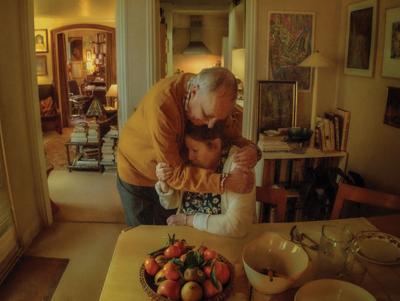The opening sequence of Vortex finds a couple, played by legendary French actress Françoise Lebrun and Italian horror director Dario Argento, both in their 80s, having a nice little lunch on the balcony of their Paris apartment. It’s a sweet moment, and as one might expect from French-Argentine writer/director Gaspar Noé, it is the bellwether of kindness and stability against which we will measure the document of unspeakable sorrow that the characters and the audience will experience over the next two-and-a-half hours. Because immediately following that scene, the film itself fractures into split screen, where it will spend the rest of its runtime. Even when in the same room, even when talking to one another, the couple is never truly connected again.
There is a sustained pain in this film that you cannot escape. Perhaps you’ve not lost anyone to dementia, or Alzheimer’s, and that’s great for you. It’s an ongoing process of cruel disassembly that I wouldn’t wish on the worst people in the world, because the thing about dementia is that it transcends ideology. There’s no tenet that survives what dementia does, so it really doesn’t matter what kind of person one might have been — it all gets shredded, and all that’s left are weirdly shaped memories, and inevitable slideshows that try and fit a life into the confines of a piece of music.
Vortex does something interesting as a film that we don’t usually see from narratives on dementia/Alzheimer’s — usually there’s a partner suffering from the actual disease, and the film focuses its perspective through the other partner. Here, in this cozy, museum-like apartment that is literally constructed from the wild academic and intellectual life that this couple has built over decades together, we are always privileged with the perspectives of both individuals. And as such, we see how the shared life, the common frame of reference that they have established and burnished, is becoming unavailable to both of them. They are both still alive, but the life they’d been living together no longer exists. There’s merely a collection of nonfunctioning save points on walls and shelves, and these two are both unmoored in what they thought was their safest and most nurturing of spaces.
Lebrun has a presence that can’t help but kick your ass. She’s kind-eyed and sturdy, propelling herself through life with the physicality of someone whose feet know the streets of her neighborhood even if those decades of certainties are no longer so certain. A retired psychiatrist, her character is suffering from dementia, and she’s keeping all sorts of things to herself. Speech is becoming a deliberate choice, rather than an ongoing activity. And there are moments when she confronts the unspannable holes in her own memory and the audience is staring into the void that awaits us all — and it burns.
There’s something equally fitting and perverse in seeing Argento, who as a filmmaker over the past 50-plus years has been responsible for some of the most baroque and imaginative dealings of death ever put on film, firmly in the grip of time and age. No black-gloved assassin, no murderdoll or unexpected room full of barbed wire or rendering corpses, no horror emerging from a museum wall is coming to disrupt the linear progression from life to death. He delivers an effective performance, rooted in a life spent calling the shots and making decisions slowly having its sturdy, vintage support structure being undone. If Lebrun’s work in this film is an even-keeled desperation, Argento is a drowning man, slipping beneath the surface of Infinite Looming End and fighting his way back out to gulp lungfuls of air and fresh draughts of sorrow.
Noé has spoken rapturously of Michael Haneke’s 2012 Palme d’Or-winning Amour, a tale of similar ongoing loss due to dementia. But Noé has always been a more ethical filmmaker than Haneke, and Vortex feels far less schematic and needly than Amour. We never feel as if we’re watching an experiment, only bearing witness to an unending ache. After a brain hemorrhage almost killed him on New Year’s 2020, Noé emerged and made this film, both a tribute to his mother (who died of dementia in 2012) and to his hard-won perspective on the fragility of existence. For someone who has specialized in films that exhibit extreme content, he has always rooted his work in real emotion. If Vortex is the beginning of a new pathway for Noé, know that he has in no way mellowed — this is the most pitiless film he’s yet made. And he’s still one of the best we’ve got.





